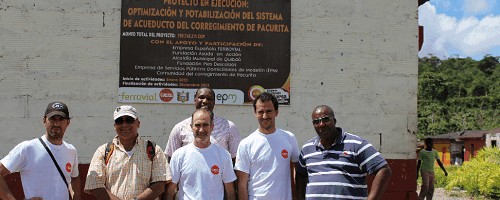
Challenges and strategies in Public-Private Partnerships for Development in Spain
17 of December of 2013
In this article published by ONGAWA, Gonzalez Sales, our Head of Corporate Responsibility Programmes, provides an overview of the situation and the outlook for public-private partnerships (PPP) for development in Spain.
The term “public-private partnership” is still quite new in Spain, although it’s a common formula in other countries for cooperation between sectors, and not just in a social context. Broadly speaking, it’s an “arrangement between the public and private sectors where part of the services or works that fall under the responsibilities of the public sector are provided by the private sector, with clear agreement on shared objectives” (World Bank). However, and as Fernando Casado highlights in “Alianzas públicoprivadas para el desarrollo” (Public-private partnerships for development; Fundación Carolina – CeALCI, 2007), the name PPP, by focusing exclusively on the public-private format, is limited in that it fails to take account of third sector organisations; that is why the term “partnerships for development” was adopted. Along these lines, Spanish development cooperation (public and private) is progressively advancing towards an action model based on cooperation between participants from various sectors of society.
In the 4th Master Plan for Spanish Development Cooperation (2013-2016), the section entitled “Challenges for all system participants” includes the term “Inclusive partnerships for development” as a mechanism for generating cooperation based on learning and knowledge through a commitment by all parties to contribute experience and skills, from a position of diversity and wealth of knowledge, to build a different, shared model of cooperation. Given the extensive literature on this topic, this article seeks only to offer a practical overview of PPP for development in Spain.
The situation in Spain
After five years of economic crisis, the public and private sectors are still struggling to return to growth and prosperity. Unemployment exceeded 26% for the first time in history, with the result that job creation is a social priority. Additionally, the public sector is trying to improve its fiscal outlook. The economic projections for the coming years is that governments will continue working to control the fiscal deficit, increase exports, and enhance competitiveness and labour market flexibility, while also seeking to maintain social programmes, promote employment, and combat poverty and social exclusion, using a strategy based on programme efficiency.
Spain is a world leader in Corporate Social Responsibility. The Spanish Global Compact Network currently has 2,409 members, of which 13% are large companies. However, Spain’s business sector still has a predominantly philanthropic approach to CSR. Just 37% of Spanish companies include CSR in their corporate strategies, and of those only 45% have created a specific CSR department, while 46% have policies and procedures in this area.
The outlook is somewhat hopeful: despite the crisis, 59% of Spanish companies remain committed to CSR and 69% will maintain their CSR budgets¹. The most pressing issues for business are: corruption (94%), local social causes (85%), workplace health and safety (82%), and workforce preservation (79%). The areas in sustainability programmes that function best at the companies surveyed in Spain are those directly related to philanthropy and volunteer programmes, transparency, and waste abatement and recycling².
The situation is less promising in the third sector: Private funding has continued to slide (by €648mn between 2008 and 2012), to €2.407bn in 2012, from the following sources: own funds (48%), partners and donors (23%), savings banks’ social projects (21%), and companies (8%). The current situation of cutbacks is expected to worsen in the next four years, which could lead to a decline of up to 20% in public funding and over 16% in private funding in 2016³, compared with 2011.
Challenges facing PPPs for development in Spain
In view of this situation, a new relationship framework must be created between the various players, combining efforts, distributing roles and combining capabilities.
The first challenge is to find social institutions with a more flexible structure that is able to respond rapidly to the needs of financiers, which increasingly want to make targeted donations to projects that pursue specific goals, as opposed to merely raising awareness of funding a social organisation’s general operating costs (this issue merits its own article in view of the new trend in the private sector of not funding those types of costs). To this end, the most appropriate social organisation model is one with a lean structure and little bureaucracy, which operates horizontally and on the ground, in close proximity to the beneficiary. The private sector should “specialise” its social investments, aligning them with its business strategy to achieve synergies from the impact on both society and its own business.
The second challenge is to establish a diversified funding model in the third sector (ideally 33% public, 33% private, 33% individual donors) and to organise strategies according to the “target audience” (public administrations, companies or individuals). Specialisation of companies’ social investment would improve social organisations’ efficiency and speed in identifying the resources available and enhance sustainability in relations between companies and NGOs.
The third challenge is to focus on results and measure the impact of social projects, with continuous reporting to the funder with regard to the attainment of the established objectives. Having a series of agreed indicators for programme or project objectives would enable us monitor to them together (funder and executor). Measuring and evaluating impacts and lessons learned is the best path to efficiency and efficacy in social projects and the partnerships that sustain them.
The final (and perhaps the most complicated challenge) is building networks for shared collaboration and action among social entities seeking a common impact. The generation of scale economies through shared programmes would impact the efficacy of cooperation, not only for the third sector, but also for the business sectors and companies, due to sharing of resources and tools.
Plan of Action for PPP for Development
The first steps is to create a favourable environment, which raises awareness and understanding in Spanish society of the need to maintain a policy of development cooperation for the more than two-thirds of the global population that suffers poverty, malnutrition, vulnerability and exclusion that is without precedent in our (still) “developed” society. Given the current socio-economic context in Spain, it’s difficult to raise awareness about this issue, as we are involved in a false debate about the artificial dilemma between development cooperation vs. social action.
To raise awareness in Spanish society of the need to continue cooperating, it is vital to increase the visibility of the contributions, and of the results obtained by social organisations. Some countries (Switzerland, the UK, etc.) have implemented outstanding initiatives with an impact of their development cooperation and the progress achieved as a result.
The next step would be to define the content for a partnership between NGOs, companies, public administrations, unions and universities to address the following:
- accurately defining the scope and objectives of each partnership,
- designing a governance structure for the partnership itself and for the participants,
- defining its composition and functions,
- deciding how to finance it,
- drafting a work plan,
- deciding how to measure and evaluate the results.
For the private sector, the best partnership is that which:
- is in line with its own business strategy,
- leverages and strengthens relations in the company’s supply chain and its main resources,
- contributes to the company’s culture and performance,
- develops the brand’s personality,
- increases trust among the parties involved, expands business opportunities, and provides access to new markets,
- has a positive impact on the community,
- leads to employee satisfaction and attracts external talent,
- increases the acquisition and loyalty of clients, partners and investors,
- improves the company’s reputation,
- generates innovation,
- enhances competitiveness.
After addressing the previous two steps, a budget should be established, the target results should be defined, and the type of resources required should be identified.
Aside from money, the private sector has multiple resources at its disposal (technology, systems, human capital, premises, networking, etc.), which are often much more valuable than a mere monetary donation. Meanwhile, third sector organisations should aim to specialise, not only in a specific type of intervention but also in the geographic area where they operate.
PPPs for development in Spain will receive a boost with the reform of Act 49/2002, on the tax regime for non-profit organisation and tax incentives for sponsorship, which provides social initiatives equal status with sports and cultural ventures and improves chapters II and III on aspects related to the clarification of pro bono work, increased personal income tax and corporate income tax credits and an improvement in the tax treatment in article 25 (Business cooperation agreements on activities of general interest). The objective is to bring our tax law into line with those in other European countries, encourage private and corporate support for social initiatives, and adapt legislation to the actual social situation. PPPs for Development should be tailored to the capacities of the participating sectors (public and/or private, academic, business or social) and align projects with the strategies of participating organisations.
Notes (all materials in Spanish)
¹ Estudio Multisectorial Sobre El Estado De La Responsabilidad Corporativa De La Gran Empresa En España, 2011, Forética.
² Grayling Pulse Quarterly Barometer for Spain (2Q2013)
³ Estudio sobre el presente y futuro del Tercer Sector social en un entorno de crisis. La Caixa Foundation, ESADE Institute for Social Innovation, PwC Foundation.





There are no comments yet